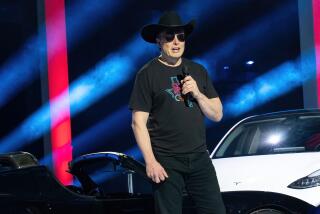Closed GM Plant May Be Research Site : Van Nuys: An assemblyman wants the facility as a center for research and development of alternative transportation projects.
- Share via
The idle General Motors plant in Van Nuys--since 1947 a symbol of the region’s auto manufacturing strength--could become the birthplace of 21st-Century transportation technologies under a plan being floated by Assemblyman Richard Katz.
A bill by the Sylmar Democrat that took effect Jan. 1 requires the California Department of Transportation to establish a research and development center in the state to help private firms produce high-speed rail lines, clean-air vehicles and other alternative transportation projects.
Katz, who will sit on an advisory board that will oversee the creation and location of the Western States Transportation Research and Development Center, said he will make a pitch for it to be established at the former GM plant.
“It’s the beginning of the creation of a new industry,” Katz said. “If we sit back and wait, this center will go to San Diego or Davis or somewhere else.”
Indeed, officials from cities and counties throughout the state have already expressed interest in having the center in their communities in hopes that it will create new jobs and spur the development of ancillary industries.
In addition to Los Angeles County, officials from Yuba, Solano, San Diego and San Bernardino counties are seeking the center, said Warren Webber, assistant director of legislative affairs for Caltrans.
“Probably every part of the state is interested in something like this,” he said.
The center would provide private firms a place to exchange ideas as they develop advanced transportation projects, Webber said. Private firms could also work together at the center on joint projects--sharing the profits of their work--or independently, he said.
Last month, Los Angeles City Councilman Mark Ridley-Thomas introduced a resolution that ordered community development officials to identify potential local sites for the center.
“We want Los Angeles to be in the mix in the terms of consideration for locating this site,” said Ridley-Thomas, who chairs the City Council’s Community and Economic Development Committee. “We are going to go after it hard.”
GM officials have said they will put the plant and its 101-acre site up for sale as early as this month. Although the plant, which is now being emptied, has generated some interest, no one has yet offered to buy it.
Russell Bell, an aide to Katz, said the assemblyman has not yet approached GM officials about the possibility of purchasing the plant.
The center would be similar in concept to an electric-vehicle research center in Burbank that is operated by CALSTART, a public-private consortium organized to promote the development of an electric-vehicle industry. The CALSTART center has generated more than $20 million in grants and has created a showcase electric car being exhibited at the Los Angeles Auto Show.
But Katz, chairman of the Assembly’s Transportation Committee and candidate for mayor of Los Angeles, said the Western States center will help jump-start the production of all types of alternative vehicles, including magnetic-levitation trains, which travel at high speeds on a cushion of air.
“We want to create a focal point for these futuristic modes of transportation,” he said.
In his campaign for mayor, Katz has outlined his vision for making Los Angeles the capital of a 21st-Century mass-transit manufacturing industry. He said the Western States center would attract ancillary industries--those that would supply services and parts for the mass-transit industries--and make the city a “Silicon Valley of transportation.”
Katz said he would like Caltrans to select a location for the center within 12 months, but Caltrans officials have said that decision may take as long as three years.
The center would be funded partly from $10 million that Caltrans sets aside each year for research and development. Katz said a federal transportation bill adopted last year could provide an additional “several hundred million dollars” for the center.
The advisory committee, which will include Katz, state Sen. Quentin L. Kopp (I-San Francisco) and several private-sector transportation experts, will establish the criteria for the center’s location and will hold public meetings to discuss its location, Webber said.
The committee will also be responsible for resolving such questions as how the center will operate, what role government will play in helping private firms share research and development information, and how the center will be funded, Webber said.
Caltrans Assistant Director Carl Williams said the “best and brightest” transportation experts from private firms will meet at the center to share ideas not only about advanced transportation projects, but also about such issues as product liability and antitrust problems.
“I see this thing as not only a center for research and development, but also as a hotbed for policy development,” he said.
More to Read
Inside the business of entertainment
The Wide Shot brings you news, analysis and insights on everything from streaming wars to production — and what it all means for the future.
You may occasionally receive promotional content from the Los Angeles Times.











